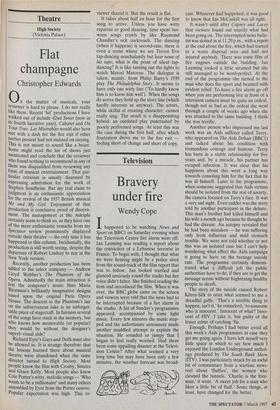Theatre
High Society (Victoria Palace)
Flat champagne
Christopher Edwards
On the matter of musicals, your reviewer is hard to please. I do not really like them. Recent 'hit' productions I have walked out of include 42nd Street (now in its fourth lucrative year), Cabaret and On Your Toes. Les Miserables would also have met with a dash for the fire exit if other parties present had not insisted on staying. This is not meant to sound like a boast. Some might read the list of shows just Mentioned and conclude that the reviewer who found nothing to recommend in any of them was disqualified from reviewing any form of musical entertainment. That par- ticular criticism is usually disarmed by expressing admiration for the work of Stephen Sondheim. But my real claim to judgment is an enthusiastic appreciation for the revival of the 1937 British musical Me and My Girl. Enjoyment of that production is conclusive proof of discern- ment. The management at the Ade1phi certainly seem to think so, as they have one of the more enthusiastic remarks from my Spectator review prominently displayed outside their theatre — the only time it has happened to this column. Incidentally, the production is still worth seeing, despite the departure of Robert Lindsay to star in the New York version.
Recently, another production has been added to the select company — Andrew Lloyd Webber's The Phantom of the Opera. Admittedly the main attraction is less the composer's music than Maria Bjornson's brilliantly imaginative designs based upon the original Paris Opera House. The descent to the Phantom's lair on the subterranean lake is an unforget- table piece of stagecraft. In fairness several of the songs have stuck in the memory, but who knows how memorable (or popular) they would be without the designer's superb visual aids?
Richard Eyre's Guys and Dolls must also be allowed in. It is strange therefore that the lessons learned there about musical theatre were abandoned when the same director turned to High Society. Most people know the film with Crosby, Sinatra and Grace Kelly. Most people also know Cole Porter's witty, melodic songs — 'Who wants to be a millionaire' and many others assembled by Eyre from the Porter oeuvre. Popular expectation was high. This re- viewer shared it. But the result is flat.
It takes about half an hour for the first song to arrive. Unless you have witty repartee or good dancing, time spent bet- ween songs crawls by like Raymond Chandler's sick cockroach. The dancing (when it happens) is second-rate; there is even a scene where we see Trevor Eve tap-dancing nonchalantly but hear none of his taps; what is the point of silent tap- dancing? It is like turning out the lights to watch Marcel Marceau. The dialogue is taken, mainly, from Philip Barry's 1939 play The Philadelphia Story. It seems to have only one witty line (`To hardly know him is to know him well'). When the songs do arrive they hold up the story line (which hardly interests us anyway). The actors, while skilful at creating character, cannot really sing. The result is a disappointing hybrid: an outdated play punctuated by poorly performed songs. At least this was the case during the first half, after which frustration drove me to the fire exit feeling short of change and short of copy.


























































 Previous page
Previous page